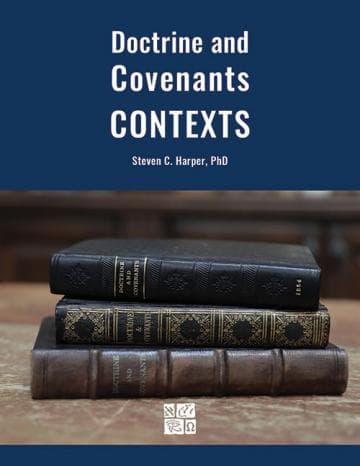Book
136 Chapters

In his inimitable way, BYU philosophy professor Truman Madsen related an anecdote during a presentation he gave at the Yale Divinity School. He told of a conversation with some Catholic priests, very learned Jesuits who expressed their inability to conceive of God as an intimate father intent on raising mankind to fully share in his glory and status. Brother Madsen said he told them it was hard for Latter-day Saints to conceive of God as anything other than a concerned father whose work and glory is to exalt all of his willing children.
What does that have to do with section 93? It’s about the nature of God as Father, Christ as Son, and it parents as well as chastises Bishop Whitney and the members of the First Presidency, saying they need to be better parents.[1] The Lord explains why he gave the revelation in verse 19: “I give unto you these sayings that you may understand, and know what you worship, that you may come unto the Father in my name, and in due time receive of his fulness.”
The Lord’s use of the word fulness tells us that we have in section 93 a revelation about exaltation. Fulness is used occasionally in the Book of Mormon and early revelations to describe the gospel, but in section 76, the first of the revelations to describe progress beyond simple salvation from sin and death, the word bursts onto the page nine times. In section 93 we hear it fifteen times and sometimes enriched, as in “fulness of truth” (v. 26) or “fulness of joy” (v. 34). Section 93 is an introductory text on how to come into the Lord's presence and become like him.
Section 93 adds intelligence to section 88’s impressive catalog of synonyms that include light, life, law, power, and glory—most memorably in section 93:36: “The glory of God is intelligence, or in other words, light and truth.” We worship “The Father,” the organizer of eternal elements and intelligent beings whom he designs to inherit his attributes and with them his “fulness of joy.” We worship a God who did not create us ex nihilo, or from nothing, but rather from eternally existing element and intelligence (vv. 33–35). We worship a God whose work is to frame worlds and inhabit them with his children, to provide them a sphere in which they can act independently, truly free to do their father's will or their own.
We worship God by choosing of our own free will to receive the intelligence, or light and truth, he offers us, to keep his commandments and therefore receive more truth, more light, more intelligence, until we know all he knows and have become all he is. We worship our Heavenly Father by becoming like him. To emulate him is the highest worship we can offer him. In section 93, Christ holds himself up as the example. “He received not of the fulness at first, but received grace for grace.” He obeyed His Father and grew by degrees of glory “until he received a fulness” (vv. 12–13). In section 93, Christ declares that we have similar potential for growth and godliness (v. 20).
There is an abrupt transition at verse 40 to pragmatic instructions, and the conclusion of the revelation “descend[s] from the heavens into the everyday concerns of Joseph and his friends. The Lord scolds them for not keeping order in their families.”[2] This part of the revelation is not disconnected from the lofty preceding verses. All of them tell how to raise children and why. God organizes life and provides his children a setting in which they can act freely. He endows them with light, truth, and knowledge to act upon independently, leaving them free to obey or disobey when “that wicked one cometh and taketh away light and truth through disobedience, from the children of men, and because of the tradition of their fathers” (D&C 93:39).
In section 93, Joseph received God’s theology of parenting and a pragmatic commandment to go and do likewise (v. 40). Moreover, since the glory of God is intelligence, there is a commandment to worship by learning, by obtaining knowledge as a means to the end that is exaltation. Exalting knowledge comes by obedience to God’s light and truth. “He that keepeth his commandments receiveth truth and light, until he is glorified in truth and knoweth all things” (v. 28).
Professor Madsen cited section 93 as a profound solution to several theological problems:
That is impressive even for Joseph Smith, the twenty-seven-year-old farmer/revelator whose history casually contextualizes section 93 by saying, “on the 6th [of May 1833] I received the following.”[4]
[1] See Source Note, Historical Introduction, and “Revelation, 6 May 1833 [D&C 93],” p. [1], The Joseph Smith Papers, accessed July 9, 2020.
[2] Richard Lyman Bushman, Joseph Smith: Rough Stone Rolling (New York: Knopf, 2005), 210.
[3] Truman G. Madsen, Joseph Smith the Prophet (Salt Lake City: Bookcraft, 1989).
[4] “History, 1838–1856, volume A-1 [23 December 1805–30 August 1834],” p. 291, The Joseph Smith Papers, accessed July 9, 2020.
Book
136 Chapters
Items in the BMC Archive are made publicly available for non-commercial, private use. Inclusion within the BMC Archive does not imply endorsement. Items do not represent the official views of The Church of Jesus Christ of Latter-day Saints or of Book of Mormon Central.